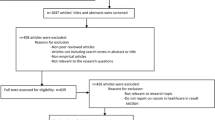Summary
American psychiatry and academic psychiatric departments currently have a diminished role in the direction, staffing and training of community mental health centers as compared to the beginning of the center movement two decades ago. Lacking sufficient psychiatric staffing, the poor and disadvantaged populations served by these centers will continue to receive inadequate mental health care. Many academic psychiatry departments consider community mental health centers to be administratively and fiscally burdensome. A frequent issue has been the problematic relationship of psychiatrists and academic psychiatry departments to community mental health center boards — particularly boards dominated by disadvantaged minority groups. However, accurate reports of these psychiatry-community board relationships are not readily available. This paper will report and analyze the organizational history of a mental health center with an active minority-dominated community board. Based upon this case study and the review of relevant literature, the author concludes: 1. Urban community mental health boards controlled by black minority members can support comunity-wide mental health service programs that are both relevant to expressed community goals and are of high professional quality. 2. Leadership crises arise from staff conflicts and not staff-community confrontations. 3. Leadership crises resulted from the ill-defined relationships of Center supporting agencies to the organized communities. 4. Community boards must have clear and legitimized relationships with other supervising organizations if they are to effectively and constructively participate in Center governance.
Similar content being viewed by others
References
Bolman WM (1972) Community control of the community mental health center. I. Introduction. Am J Psychiatry 129: 173–180
Faulkner LR, Eaton JS (1979) Administrative relationships between community mental health centers and academic psychiatry departments. Am J Psychiatry 136: 1040–1044
Gardiner EA, Gardiner ML (1971) A community mental health center case study: innovations and issues. Sem Psychiatry 3: 172–198
Hersch C (1972) Social history, mental health, and community control. Am Psychol 27: 749–754
Kaplan SR, Roman M (1973) The organization and delivery of mental health service in the ghetto. The Lincoln Hospital experience. Praeger, New York
Kellam SG, Schiff SK (1966) The Woodlawn Mental Health Center: A community mental health center model. Soc Serv Rev 40: 255–263
Kellam SG, Schiff SK (1968) The origins and evolution of an urban community mental health center in Woodlawn. In: Duhl L, Leopold R (eds) Mental health and urban social policy. Jossey-Bass, San Francisco
Kupst MJ, Reidda P, Mc Gee TF (1975) Community mental health boards: a comparison of their development, functions, and powers by board members and mental health center staff. Community Ment Health J 11: 249–256
Meyers WR, Dorwart RA, Hutcheson BR, Decker D (1974) Organizational and attitudinal correlates of citizen board accomplishment in mental health and retardation. Community Ment Health J 10: 192–197
Panzetta AF (1971) The concept of community. Arch Gen Psychiatry 25: 291–297
Pinto R, Fiester A (1979) Governing board and management staff attitudes toward community mental health center citizen participation. Community Ment Health J 15: 259–266
Roman M (1969) Community control and the community mental health center: A view from the Lincoln Bridge. Paper presented at a National Institute of Mental Health staff meeting on Metropolitan topics — Dilemma of community control: University and community relations, NIMH, Washington, DC, 21 November 1969
Schiff SK (1970) Community accountability and mental health services. Ment Hyg 54: 205–214
Schiff SK (1972) Free inquiry and the enduring commitment: The Woodlawn Mental Health Center 1963–1970. In: Golann SE, Eisdorfer C (eds) Handbook of community mental health. Century-Crofts, New York
Shaw R, Eagle CJ (1971) Programmed failure: the Lincoln Hospital story. Community Ment Health J 7: 255–263
Tischler GL (1971) The effect of consumer control on the delivery of services. Am J Orthopsychiatry 41: 501–505
Tischler GL, Wellington S (1972) Community regulation: process and problems. In: Levitt M, Rubenstein B (eds) On the urban scene. Wayne State University Press, Detroit
Williams DH (1981) The empty lot: Passage of a mental health center through a black American urban community, Part 1. Soc Psychiatry 16: 97–103
Winslow WW (1979) The changing role of psychiatrists in community mental health centers. Am J Psychiatry 136: 24–27
Author information
Authors and Affiliations
Rights and permissions
About this article
Cite this article
Williams, D.H. The empty lot: Passage of a mental health center through a black American Urban community. Soc Psychiatry 16, 163–170 (1981). https://doi.org/10.1007/BF00582676
Accepted:
Issue Date:
DOI: https://doi.org/10.1007/BF00582676




